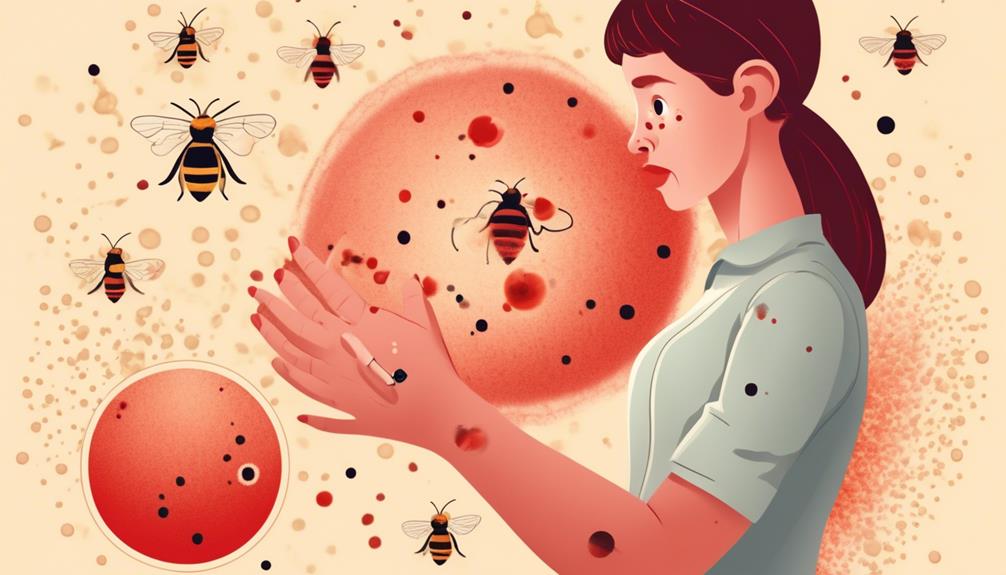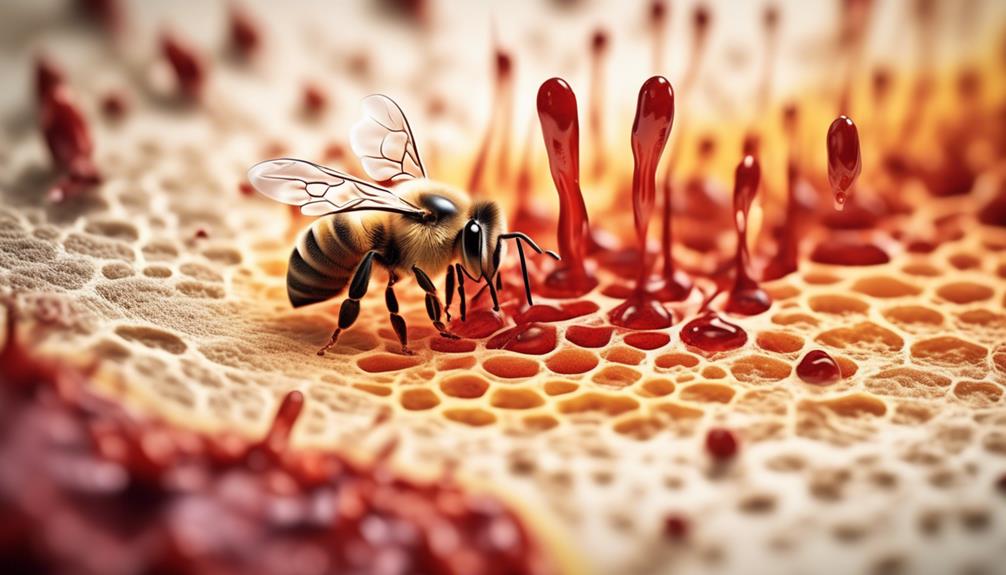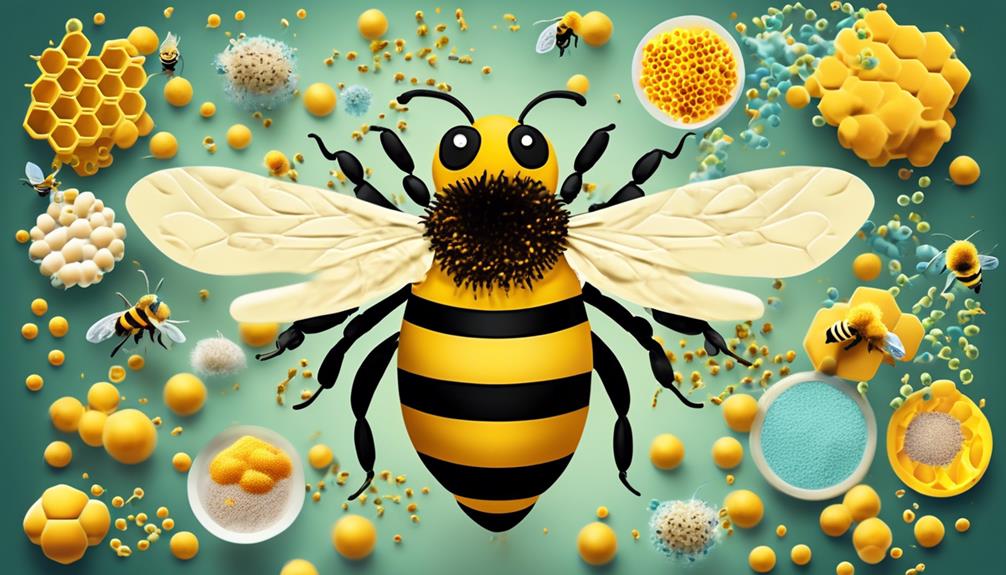Curious about your sudden allergy to bee stings? Discover the surprising reasons behind this change and learn how to manage it.

Why Am I Now Allergic to Bee Stings
Did you know that approximately 5% of the population in the United States experience severe allergic reactions to insect stings? That's right, you're not alone in this sudden shift.
Imagine enjoying the great outdoors without a care, when suddenly you're stung by a bee and your body reacts like never before. It's downright perplexing. You've been stung before with little to no reaction, so why now have you developed this allergy?
This unexpected change could be due to a variety of factors, and understanding them might just be key to managing your new sensitivity.
So, let's unravel this mystery together, shall we?
Key Takeaways
- Approximately 5% of the population in the United States experience severe allergic reactions to insect stings, including bee stings.
- Bee sting allergies can be life-threatening and require immediate medical attention.
- Allergic reactions to bee stings are triggered by an overreaction of the immune system to proteins in the venom.
- Sensitization to bee venom can occur after the first sting, and allergic reactions can develop later in life even without previous reactions.
Understanding Bee Sting Allergies

While most people experience only mild discomfort from a bee sting, for those with an allergy, the reaction can be life-threatening, so it's crucial to understand what happens in the body when this type of allergic reaction occurs.
When you're stung by a bee, your body is introduced to certain proteins present in the bee's venom. If you're not allergic, your immune system responds by producing a localized inflammation and pain. However, if you're allergic to bee stings, your immune system overreacts. It considers these proteins as harmful invaders and releases chemicals like histamine into your bloodstream, which can cause a range of symptoms from mild to severe.
A mild allergic reaction might include hives, itching, and swelling far from the sting site. In contrast, a severe reaction, known as anaphylaxis, can cause difficulty breathing, a drop in blood pressure, dizziness, or even loss of consciousness. It's an emergency situation that requires immediate medical attention.
Understanding these reactions is important, not just for your safety, but also for determining the most effective treatment strategies. You're encouraged to consult with your healthcare provider if you suspect a bee sting allergy.
The Science Behind Allergic Reactions

Now that we've examined the symptoms of bee sting allergies, let's explore the scientific mechanisms that trigger these allergic reactions in the body.
Your immune system is designed to protect you from harmful substances like bacteria and viruses. However, if you're allergic to bee stings, your immune system overreacts to the bee venom. This overreaction happens when your immune system identifies bee venom as an invader. It produces antibodies, specifically Immunoglobulin E (IgE), against the venom. These antibodies then trigger certain cells to release chemicals, including one called histamine.
Histamine is a key player in your allergic reactions. It causes your blood vessels to expand and your skin to swell, leading to the common symptoms of an allergic reaction. It can also trigger more severe reactions, like anaphylaxis, if the amount of histamine released is large enough.
Your first bee sting sensitizes your immune system to the venom, but it's typically your subsequent stings that manifest the allergic reaction. This is because your body needs time to produce the IgE antibodies that react to the venom. So, even if you weren't allergic to your first bee sting, you might develop an allergy later in life.
Reasons for Newly Developed Allergies

You might wonder why you're suddenly experiencing allergic reactions to bee stings when you've been stung before without any issues. The reason for this sudden change could be due to a condition called 'sensitization'.
This is when your immune system, upon repeated exposure to an allergen, like bee venom, develops an allergic response. It's a quirky aspect of your body's defenses, kind of like a mistaken identity.
Your immune system is designed to protect you from harmful substances, such as viruses and bacteria. However, it can overreact sometimes, treating harmless substances as threats. When you're stung by a bee, a protein in the venom can trigger this overreaction.
The first time you're stung, you may not react at all, but your body is quietly taking notes. If you're stung again, your body recognizes the venom and launches an immune response, causing an allergic reaction.
The severity of the reaction can vary greatly from person to person. For some, it can cause mild irritation and swelling, while for others, it can trigger a life-threatening condition called anaphylaxis. It's unpredictable, which is why it's important to take every bee sting seriously.
Managing a Bee Sting Allergy

Given the potential severity of allergic reactions to bee stings, it's crucial to understand how to manage this allergy effectively. If you've been diagnosed with a bee sting allergy, immediate action can be life-saving.
Firstly, always carry an epinephrine autoinjector. This device delivers a dose of adrenaline which can reverse the allergic reaction. If you're stung, use it immediately and seek medical attention. It's not a cure, but it buys you valuable time.
Secondly, consider immunotherapy. It's a treatment where you're given gradually increasing doses of bee venom to build up your immunity. It's shown to be 90% effective in preventing severe reactions.
Lastly, avoid bees whenever possible. Wear light-colored clothing and avoid floral perfumes. Be vigilant around food and drinks outdoors as they attract bees.
Prevention and Treatment Options

Arming yourself with knowledge about prevention and treatment options is a critical step towards minimizing risks associated with bee sting allergies. Prevention is key, and it starts with avoiding areas where bees are likely to be, such as gardens and orchards. If you must go into these areas, wear clothing that covers your skin, and avoid bright colors and floral patterns, which can attract bees.
If you've been diagnosed with a bee sting allergy, it's important to always carry an epinephrine auto-injector (EpiPen) with you. This device can quickly deliver a dose of medicine that can reduce the severity of an allergic reaction.
In terms of treatment, the most effective option is venom immunotherapy, which involves injecting small amounts of bee venom into your body over time. This can help your immune system become less sensitive to bee venom and reduce the risk of a severe allergic reaction. However, it's important to note that this treatment isn't suitable for everyone and can have side effects.
Always consult with a healthcare professional to find the right prevention and treatment options for you.
Frequently Asked Questions
Can Bee Sting Allergies Be Genetically Inherited?
Yes, you can genetically inherit a predisposition to bee sting allergies. However, it's not guaranteed you'll develop one just because a parent has it.
Allergies are complex conditions influenced by both genetics and environment. If you've been stung and didn't have a reaction, that doesn't mean you're in the clear. Allergies can develop over time with repeated exposure.
It's always important to be cautious around bees, even if you don't think you're allergic.
Are Certain Age Groups More Prone to Developing Bee Sting Allergies?
You're not alone in wondering if certain age groups are more prone to developing bee sting allergies. While it can occur at any age, research shows that severe reactions are more common in adults.
This might be due to adults having more exposure to stings, or their immune systems reacting differently. However, it's essential to remember that anyone can develop an allergy at any time, and precautions should be taken regardless of age.
What Are the Potential Long-Term Effects of Repeated Exposure to Bee Stings?
Repeated exposure to bee stings can cause your body to develop an allergic reaction over time. You might initially not have any adverse reaction, but with each sting, your immune system could become sensitized. This means it's preparing a defensive reaction for future stings.
Eventually, you could have a severe allergic reaction, known as anaphylaxis, which requires immediate medical attention. So, it's crucial to take precautions if you're frequently exposed to bees.
Is It Possible to Be Allergic to Only Certain Types of Bees?
Yes, it's possible to be allergic to only certain types of bees. Your immune system may react differently to various bee venoms.
For instance, you might be allergic to honeybee stings but not to bumblebee stings. This is due to the different proteins found in each type of bee's venom.
Always consult with a medical professional if you've been stung and are experiencing severe reactions, as this could indicate an allergy.
Can Other Insect Stings Trigger a Similar Allergic Reaction as Bee Stings?
Yes, you can have a similar allergic reaction to stings from other insects like wasps, hornets, and yellow jackets. They all inject venom that can cause an allergic response. Your immune system might react to certain proteins in the venom, leading to symptoms like swelling, redness, and itching.
It's important to get medical help if you have severe reactions, as they can be life-threatening.
Conclusion
So, you've suddenly developed a bee sting allergy. It's perplexing, isn't it?
The science suggests that your immune system is now overreacting to bee venom. While it's unclear why this happens, it's essential to manage this new allergy effectively.
Prevention is key, but if you're stung, swift treatment is crucial. Remember, being informed and prepared can help you navigate this unexpected turn in your health journey.
Stay vigilant and consult your doctor for tailored advice.


